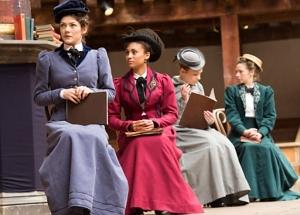Blue Stockings
In this year's Globe programme, entitled 'Season of Plenty', we've moved on from the Shakespearian plays and now find ourselves deep in academic territory in this new play by Jessica Swale. Set in Girton College Cambridge at the end of the nineteenth century, this is Ms Swale's first full-length play, and is concerned with the struggle for women to gain equality with men in being able to study at university and graduate with a degree.
It's 1896, and four young women have just arrived at Girton College. They are highly intelligent and eager to learn, but find themselves in the middle of an academic battle being waged against their all-female college. Ranged against them are the male fellows and professors from the other colleges and institutions of the university, as well as most of the male undergraduates. One of the lecturers tells us that the higher education of women is 'detrimental to their physiology' and informs us of the concept of the 'wandering womb', provoking considerable amusement among the audience.
Life for the young women is complex. Chaperoned by Miss Bott (Hilary Tones) wherever they go, their freedom is significantly constrained since they cannot meet men, even in the public areas of the college, without supervision. And when they ask questions of their lecturers, they are promptly thrown out and forbidden from attending any more. But they also have to face other, non-academic issues, such as when the particularly gifted Maeve (Molly Logan) discovers that her mother has died, she is promptly sent home to look after her siblings.
Elizabeth Welsh (played by Gabrielle Lloyd) is the Mistress of Girton (the principal of the college) and she knows she has to tread a politically delicate line if she is to obtain her goal of women being granted equal rights to graduate. But she faces a formidable task. First, she has to convince the university to allow a vote on the matter, and then has to persuade enough of the (wholly) male graduates to vote in favour. At the same time, she does not want her campaign to be tainted by the 'radicals' of the suffragette movement which she believes would antagonise the university, even if they might provide much-needed support.
Jessica Swale is perhaps better known as a director - she directed 'Bedlam' at the Globe back in 2010 - but she has found the right balance in her first full-length play to keep the audience fully engaged. It is a difficult story to tell, largely because of the complexities of the subject, but it is certainly one that deserved telling in dramatic form. There's plenty of humour, especially during the first half, as the young students get to grips with their new life at university, ride their first bicycle and attend their first lectures. However, in the second half, John Dove's pacey direction nudges the action into a higher gear when tempers rage as the crucial vote approaches, and Girton College comes under siege.
If you are wondering about the title, the phrase had its origins way before the time period examined here. 'Bluestocking' was originally a term used to describe intellectuals of both sexes, before becoming a (largely) derogatory term used exclusively for educated women.
The fight for equality at Cambridge was neither easy nor quick. It will be something of a shock for most people to learn that it was not until 1948 that Girton was fully accepted into the university as a college and with full rights for women to be members of the university and graduate along with men.
"It's not a great play, but it is a touching and entertaining evening."
Charles Spencer for The Daily Telegraph
"Director John Dove does a good job of investing the piece with energy...This is a promising playwriting debut for [Jessica] Swale, who is adept at locating the comedy in conflict and embarrassment, but the serious scenes of scholarly discussion are too static and talky."
Henry Hitchings for The Evening Standard
"A lively and eye-opening piece about the battle for equality in education."
Paul Taylor for The Independent
External links to full reviews from popular press
Independent - Telegraph -
Originally published on
